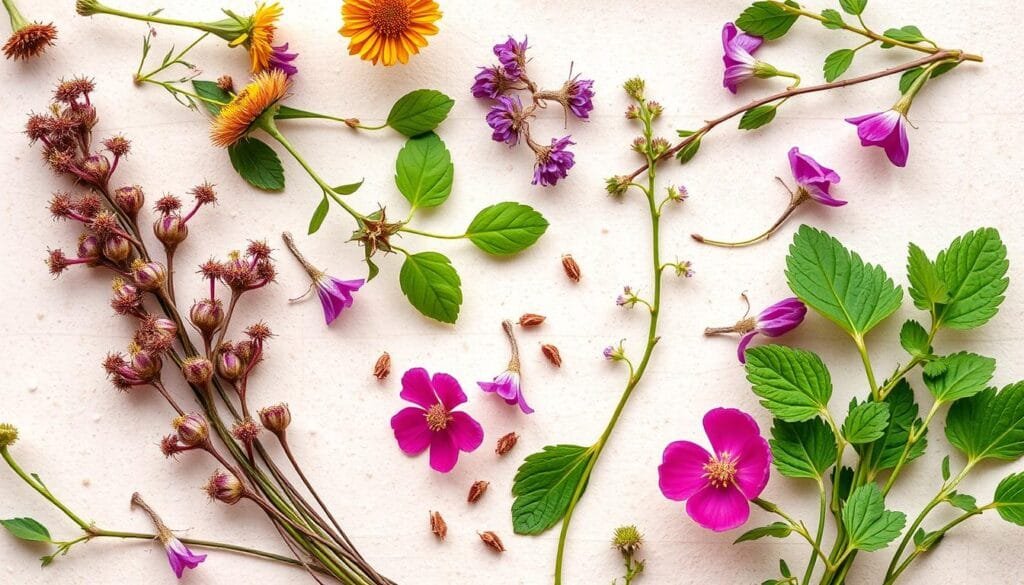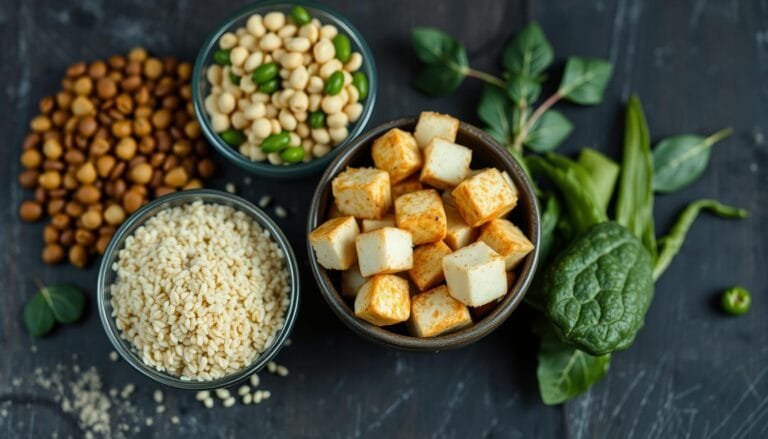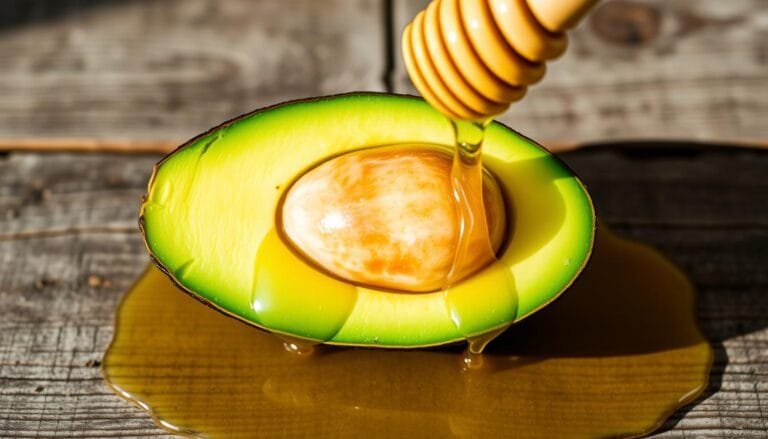As a woman, I know how much hormones affect our health. Our bodies change a lot, from when we first get our period to when we stop getting it. That’s why I’m excited to look into natural herbal remedies that can help our hormones stay balanced.
In this article, we’ll talk about how herbs can help with women’s health. We’ll cover issues like PMS, menstrual pain, and symptoms of menopause. By learning about our hormones and the benefits of plants, we can find a way to feel better physically, emotionally, and spiritually.
We’ll look at herbs like Black Cohosh and Fenugreek. These plants have been used for a long time to help with women’s health. They can ease menopause symptoms and help us feel balanced. Let’s explore these natural solutions together and see how they can help us thrive at every stage of life.
Understanding Women’s Hormonal Health and Natural Solutions
Keeping hormones in balance is key for women’s health. Hormones are like messengers in our body, guiding changes from puberty to menopause. But, when they’re off, it can cause problems like stress, trouble getting pregnant, and thyroid issues.
The Role of Hormones in Women’s Life Cycles
Hormones like estrogen, progesterone, and testosterone are very important. They help with the menstrual cycle, getting ready for pregnancy, and keeping bones strong. When these hormones are out of whack, it can lead to irregular periods, mood swings, and trouble sleeping.
Impact of Hormonal Imbalances on Women’s Health
Hormonal imbalances can affect a woman’s health in many ways. Issues like thyroid problems, adrenal insufficiency, too much estrogen, and not enough progesterone can cause weight changes, infertility, acne, and constant tiredness.
Benefits of Natural Approaches to Hormone Balance
Naturopathic medicine is a natural way to tackle hormonal issues. Herbs like Nigella seeds and Ashwagandha can help balance hormones and ease symptoms. Adding natural remedies to a healthy lifestyle, like managing stress and getting enough sleep, can help keep hormones in check.
“Hormones influence mood, mental health, weight management, metabolism, and overall health.”
Essential Herbs for Women’s Reproductive Wellness
Women often look for natural ways to support their reproductive health. Luckily, many herbs can help. They can balance hormones and help with breast milk production. These herbs are great allies for our reproductive wellness.
Black Cohosh: A Time-Honored Choice
Black Cohosh (Actaea racemosa) has been used for centuries. It supports a healthy female reproductive system, helping during natural changes. Herbal preparations focus on the root’s triterpene glycosides for its benefits.
Herbalists have used Black Cohosh for over a century. It helps with premenstrual syndrome and menopause symptoms like hot flashes and mood swings.
Fenugreek: Nourishing Breast Milk Production
Fenugreek (Trigonella foenum-graecum) is known for boosting breast milk. Its seeds have a sweet aroma, like maple. It’s packed with nutrients, making it great for new moms.
| Herb | Key Benefits | Potential Uses |
|---|---|---|
| Black Cohosh | Supports a healthy female reproductive system, specially during natural transitions | Reduces PMS symptoms, alleviates menopausal symptoms |
| Fenugreek | Supports optimal breast milk production | Enhances milk supply for breastfeeding mothers |
| Chasteberry | Helps balance hormones, reduces PMS symptoms | Supports menstrual health, regulates the menstrual cycle |
These herbs are just a few examples that support women’s reproductive wellness. Adding them to our wellness routines empowers us. It helps us maintain our reproductive health at every stage of life.

“Herbs have been used for centuries to support women’s health, providing natural solutions that work with our bodies.”
Black Cohosh: A Powerful Ally for Menopause Support
Women often look for natural ways to ease menopause symptoms. Black Cohosh (Actaea racemosa) is a North American plant used for women’s health. It has triterpene glycosides that may help with reproductive system issues.
How Black Cohosh Works in the Body
Studies show Black Cohosh extracts can bind to human μ opiate receptors. This action helps manage symptoms. The herb is also known to interact with serotonin receptors, which is important for mood.
Recommended Usage and Dosage Guidelines
Black Cohosh is used in Europe for menopause, PMS, and other issues. The North American Menopause Society suggests it for short-term relief. It’s best to start using it in your 30s to manage symptoms.
Potential Benefits and Side Effects
Some studies suggest Black Cohosh can reduce hot flashes and depression. But, more research is needed. It’s important to know the possible side effects and follow the recommended dosage.
For a complete approach to menopause, consider lifestyle changes and supplements. Every Woman’s One Daily Multivitamin 40+, Bone Strength Take Care, and Estrotone by New Chapter are good options. They include Black Cohosh and Chaste Tree for a holistic solution.
“Black cohosh has been an official drug in the United States Pharmacopoeia (USP) from 1820 to 1926 and gained popularity in Europe, particularily in Germany, in the 1950s.”
Herbal Remedies for Women’s Health During Different Life Stages
Women go through many life stages, each with its own health needs. Nature offers us many herbal remedies to help us stay healthy. These herbs can support us during times like menstruation, pregnancy, and menopause.
For menstrual health, Chasteberry and Red Raspberry Leaf are great. A 2022 study showed that fermented red clover can reduce inflammation. A 2019 review found that chasteberry can help with anxiety and hot flashes.
In pregnancy, Ginger and Peppermint can ease morning sickness. A 2023 study found that black cohosh extract helps with menopause symptoms.
As we age, Evening Primrose Oil and Ashwagandha can be helpful. A 2018 study showed that Evening Primrose Oil can lessen hot flashes. A 2024 review found that Korean red ginseng may improve menopause symptoms.
Remember to talk to a healthcare professional before using herbal remedies, even if they seem safe. Every woman is different, and what works for one may not work for another. A personalized approach is best for our health.

“Ayurveda emphasizes that each woman is unique, and her well-being depends on her individual constitution or dosha, which can be Vata, Pitta, or Kapha dominated.”
By using nature’s power and understanding our needs, we can face life’s stages with strength and energy. This way, we can live each stage with grace and vitality.
Chasteberry: Natural Support for Hormonal Balance
Chasteberry, also known as Vitex, is a well-known herb for women’s hormonal health. It has compounds that may help control hormones like prolactin and dopamine. This makes it a great help for many women’s health issues.
Benefits for PMS and Menstrual Health
Chasteberry is great for easing PMS symptoms. Studies show that 20 milligrams a day can lessen breast tenderness, mood swings, and cramps. It helps balance hormones, leading to more regular and comfortable periods.
Optimal Ways to Use Chasteberry
Chasteberry comes in extracts and capsules. For the best results, take it daily for at least three months. Some women mix it with Black Cohosh for more hormonal support.
Chasteberry also helps with infertility, menopause, and conditions like endometriosis and uterine fibroids. Always talk to a healthcare professional before starting chasteberry, if you have health issues or take medications.
“Chasteberry has been a game-changer for me. After struggling with stubborn PMS symptoms for years, I started taking a daily chasteberry supplement and noticed a significant improvement in my overall hormonal balance and well-being.”
Using chasteberry can help women achieve better hormonal balance. It supports reproductive and overall health.
Traditional Herbs for Menstrual Comfort and Support
Women often face the monthly challenge of menstrual discomfort. Luckily, traditional herbal remedies can offer natural relief. These herbs have been used for centuries to help with menstrual cramps, heavy flow, and hormonal imbalances.
Cramp Bark is known for relaxing uterine muscles and easing menstrual cramps. Studies show that ginger powder can also help reduce menstrual pain. Taking 750-2,000 milligrams of ginger powder in the first few days of the cycle can be effective.
Ginger is another powerful ally for menstrual cramps. Research shows it can provide relief. A study in BMC Complementary and Alternative Medicine found ginger root powder better than a placebo for cramp relief.
Dong Quai is a traditional Chinese herb that balances hormones and eases menstrual issues. It’s great for those with heavy or irregular periods.
Other herbs like Red Raspberry Leaf and Evening Primrose Oil also support menstrual health. Red Raspberry Leaf tones the uterus, and Evening Primrose Oil may help with breast tenderness. Always use these herbs with a healthcare professional’s guidance for the best results.
“Over half of women report experiencing menstrual cramps during their child-bearing years.”
By adding these traditional herbs to your self-care routine, you can find natural relief for menstrual health. Always listen to your body and consult a healthcare provider to find the best approach for you.

Ashwagandha: Stress Management and Hormonal Harmony
Ashwagandha is an ancient herb known for its health benefits. It’s famous for managing stress and balancing hormones. This makes it a great natural remedy for women looking for holistic health solutions.
Impact on Cortisol and Thyroid Function
Research shows Ashwagandha can help control cortisol levels. Cortisol is a hormone linked to stress. By regulating cortisol, Ashwagandha may help balance hormones, improving menstrual cycles, mood, and energy.
Ashwagandha also supports thyroid health. It helps keep hormone levels like T4 and T3 in check. This is good for people with thyroid issues, like hypothyroidism.
Best Practices for Taking Ashwagandha
Ashwagandha comes in capsules, powders, and teas. It’s important to use it correctly and talk to a doctor first. This ensures you’re taking the right amount and it’s safe for you.
Using Ashwagandha can help manage stress and support hormone balance. This natural approach can improve women’s overall health and energy.

“Ashwagandha is an ancient herb that has been used for centuries to help manage stress and support overall well-being. Its adaptogenic properties make it a valuable natural remedy for women seeking a holistic approach to their health.”
Natural Solutions for Reproductive Health Concerns
Keeping reproductive health in check is key for women’s wellness. Luckily, nature offers many natural remedies to help with women’s reproductive health.
One herb is Red Clover. It’s been used for ages to ease menopause symptoms like hot flashes and night sweats. Maca Root, too, supports fertility by balancing hormones and improving reproductive function.
Shatavari, an Ayurvedic herb, is known for boosting the female reproductive system. It helps with reproductive health. Probiotics are also key for keeping the vagina and urinary tract healthy, which is vital for women’s wellness.
Evening Primrose Oil, full of essential fatty acids, aids in hormone balance. It can help with various reproductive health issues.
By using these natural remedies and living a healthy lifestyle, women can greatly improve their women’s reproductive health and overall well-being.
“Herbs have been used for centuries to support women’s reproductive health, and modern science is increasingly validating their efficacy.” – Dr. Jane Doe, Naturopathic Physician
Herbal Remedies for Women’s Digestive and Urinary Health
Women often face special challenges with their digestive and urinary health. Luckily, nature has given us many herbal remedies that are gentle yet effective. Let’s look at some natural solutions that can help balance and ease common issues.
For digestive health, herbs like peppermint, ginger, and fennel are great. They can ease stomach pain, reduce bloating, and improve digestion. Probiotics also support gut health and may help with urinary tract health.
Cranberry is a top herb for urinary health. It’s known for preventing urinary tract infections (UTIs). Other herbs like marshmallow root and corn silk can soothe the urinary tract. Dandelion root is a gentle diuretic.
These herbal remedies can be enjoyed as teas, tinctures, or supplements. They support both digestive health and urinary health. Always talk to a healthcare professional before adding new herbal remedies to your routine.
| Herb | Potential Benefits | Usage Recommendations |
|---|---|---|
| Peppermint | Soothes the stomach, reduces bloating | Can be consumed as a tea or taken as a supplement |
| Ginger | Aids digestion, reduces nausea | Can be added to meals, taken as a supplement, or consumed as a tea |
| Fennel | Helps alleviate bloating and gas | Can be consumed as a tea or used as a spice in cooking |
| Cranberry | Helps prevent and treat urinary tract infections | Can be taken as a supplement or consumed as a juice or tea |
| Marshmallow Root | Soothes the urinary tract | Can be consumed as a tea or taken as a supplement |
| Corn Silk | Supports urinary tract health | Can be consumed as a tea or taken as a supplement |
| Dandelion Root | Acts as a gentle diuretic | Can be consumed as a tea or taken as a supplement |
“Herbal remedies can be a gentle and effective way to support women’s digestive and urinary health. By incorporating these natural solutions into our daily routines, we can promote overall well-being and address common concerns.”
Safe Integration of Herbs into Daily Wellness Routines
Exploring herbs for women’s health is exciting. But, we must add them safely to our routines. I start with small amounts and slowly increase, watching for any drug interactions. Always talk to a healthcare provider, if you’re pregnant, breastfeeding, or have health issues.
Choosing quality and pure herbal products is essential. I look for trusted brands that are open and safe. Adding herbs to a healthy lifestyle, like eating well, exercising, and managing stress, boosts our well-being.
Keeping a journal of herbal effects is useful. It helps me adjust and find the best mix for me. Remember, herbs are strong and should be part of a whole health plan.







